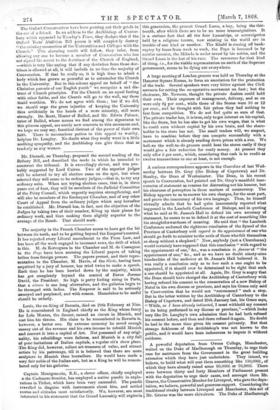A curious ccrrespondence appears in the Guardian of last Wed-
nesday between Dr. Gray (the Bishop of Capetown) and Dr. Stanley, the Dean of Westminster. The Dean, in his recent speech in Convocation, had pointed out Dr. Gray's manifold inac- curacies of statement as reasons for distrusting not his honour, but his clearness of perception in these matters of controversy. The Bishop appears to us to answer his own charges, for the most part, and prove the inaccuracy of his own language. Thus, he himself virtually admits that he had quite inaccurately reported what happened in the Lambeth Conference of Bishops, and in quoting what he said at St. James's Hall to defend his own accuracy of statement, he seems to us to defend it at the cost of something like his straightforwardness of meaning. He said that "the Lambeth Conference endorsed the righteous conclusion of the Synod of the Province of Canterbury with regard to the appointment of one who should go forth to minister to the souls of those who felt themselves as sheep without a shepherd." Now, anybody (not a Churchman) would certainly have supposed that this conclusion "with regard to the appointment of one," &c., was a conclusion in favour of "the appointment of one," &c., and so we have no doubt ninety-nine hundredths of the audience at St. James's Hall believed it. It was really a conclusion only as to how such a one ought to be appointed, if it should ever be determined to be right that such a one should be appointed at all. Again, Dr. Gray is angry that the Dean should have charged the Archbishop of Canterbury with having refused his consent to the consecration of a new Bishop of Natal in his own diocese or province, and says his Grace only said in Convocation that he would not "recommend" such a step. But in the letter written by the Archbishop of Canterbury to the Bishop of Capetown, and dated 29th January last, his Grace says, "While, as I have already intimated, I must withhold my consent to its being performed in my diocese or province," —which looks very like Dr. Longley's own admission that he had both refused his consent before, and then and there refused it again. No doubt he had in the mean time given his consent privately. But that strange fickleness of the Archbishop's was not known to the public, and it would have been indecorous to impute it without evidence.


































 Previous page
Previous page